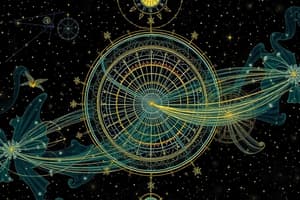Podcast
Questions and Answers
What does physics investigate?
What does physics investigate?
- Energy, matter, space, time, and their interactions (correct)
- Historical events and ancient civilizations
- Geological formations and weather patterns
- Human behavior and emotions
Why do physicists ask questions like 'Why do objects fall down instead of up?'
Why do physicists ask questions like 'Why do objects fall down instead of up?'
- To explore the art forms in nature
- To understand the behavior of animals in motion
- To uncover profound insights that revolutionize human understanding (correct)
- To solve mysteries related to human psychology
How does motion contribute to our understanding of natural and manmade systems?
How does motion contribute to our understanding of natural and manmade systems?
- By controlling human emotions
- By predicting historical events accurately
- By analyzing food production techniques
- By explaining the dynamics of physical phenomena (correct)
Which branch of science explores subjects like energy, matter, and their interactions?
Which branch of science explores subjects like energy, matter, and their interactions?
Why is understanding motion important for scientists?
Why is understanding motion important for scientists?
What does motion encompass in our daily lives?
What does motion encompass in our daily lives?
According to Newton's first law of motion, what happens to the velocity of an object when there is no net force acting upon it?
According to Newton's first law of motion, what happens to the velocity of an object when there is no net force acting upon it?
What does Newton's third law of motion state regarding forces?
What does Newton's third law of motion state regarding forces?
In Einstein's theory of relativity, what causes time to slow down as speed increases?
In Einstein's theory of relativity, what causes time to slow down as speed increases?
What does Albert Einstein's general theory of relativity explain about the curvature of spacetime near massive bodies?
What does Albert Einstein's general theory of relativity explain about the curvature of spacetime near massive bodies?
How does Sir Isaac Newton describe the relationship between forces and accelerations?
How does Sir Isaac Newton describe the relationship between forces and accelerations?
What valuable lessons can we learn by exploring physics through motion according to the text?
What valuable lessons can we learn by exploring physics through motion according to the text?
Flashcards are hidden until you start studying
Study Notes
Exploring Science through Physics and Motion
As we dive into the realm of science, two particularly fascinating branches intersect to weave intricate tales of our universe's behavior—physics and motion. Let's embark on this enlightening journey together!
The Beauty of Physics
Physics is both an art form and a rigorous discipline that investigates the fundamental aspects of nature and how everything works. It explores subjects such as energy, matter, space, time, and their interactions with one another. In simpler terms, it's asking questions like: Why do objects fall down instead of up? How does light travel so fast? What can push us forward when nothing seems to touch us? These curiosities have led physicists to uncover profound insights which revolutionize human understanding.
Motion: A Universal Language
Motion embodies the dynamics of physical phenomena around us. From the orbiting planets in our solar system to leaves fluttering in the wind, from athletes sprinting on tracks to cars driving on highways, almost every occurrence involves some degree of movement. Understanding motion forms a crucial part of comprehending natural and manmade systems alike. Being able to describe, predict, control, and optimize movements helps scientists develop theories, inventions, and technologies that shape modern life.
Newtonian Mechanics
Sir Isaac Newton, one of history's most celebrated scientists, introduced three laws that govern motion in his renowned work called Principia Mathematica. His first law states that if there is no net force acting upon an object, its velocity remains constant; secondly, forces cause accelerations proportional to mass; thirdly, for each action, there exists an equal and opposite reaction. Together these principles lay a strong foundation for comprehension and manipulation of motions occurring in daily life and throughout the cosmos.
Einstein's Relativity Theory
Albert Einstein proposed special relativity in 1905 and general relativity in 1915, offering deeper insights into our understanding of the world. As speed increases, he asserted, time begins to slow down relative to observers outside the moving reference frame. Additionally, gravity emerges due to massive bodies warping spacetime, causing objects within that gravitational field to experience curvature, explaining why things move closer towards celestial bodies. This theory continues pushing the boundaries of our knowledge about motion, altering classical mechanics' presumptions forever.
In conclusion, exploring physics through motion provides a unique perspective to appreciate the beauty of the natural world. By examining fundamental concepts and embracing groundbreaking ideas – whether it's Sir Isaac Newton's laws or Albert Einstein's relativity theory – we unearth valuable lessons about ourselves and the universe beyond.
Studying That Suits You
Use AI to generate personalized quizzes and flashcards to suit your learning preferences.




